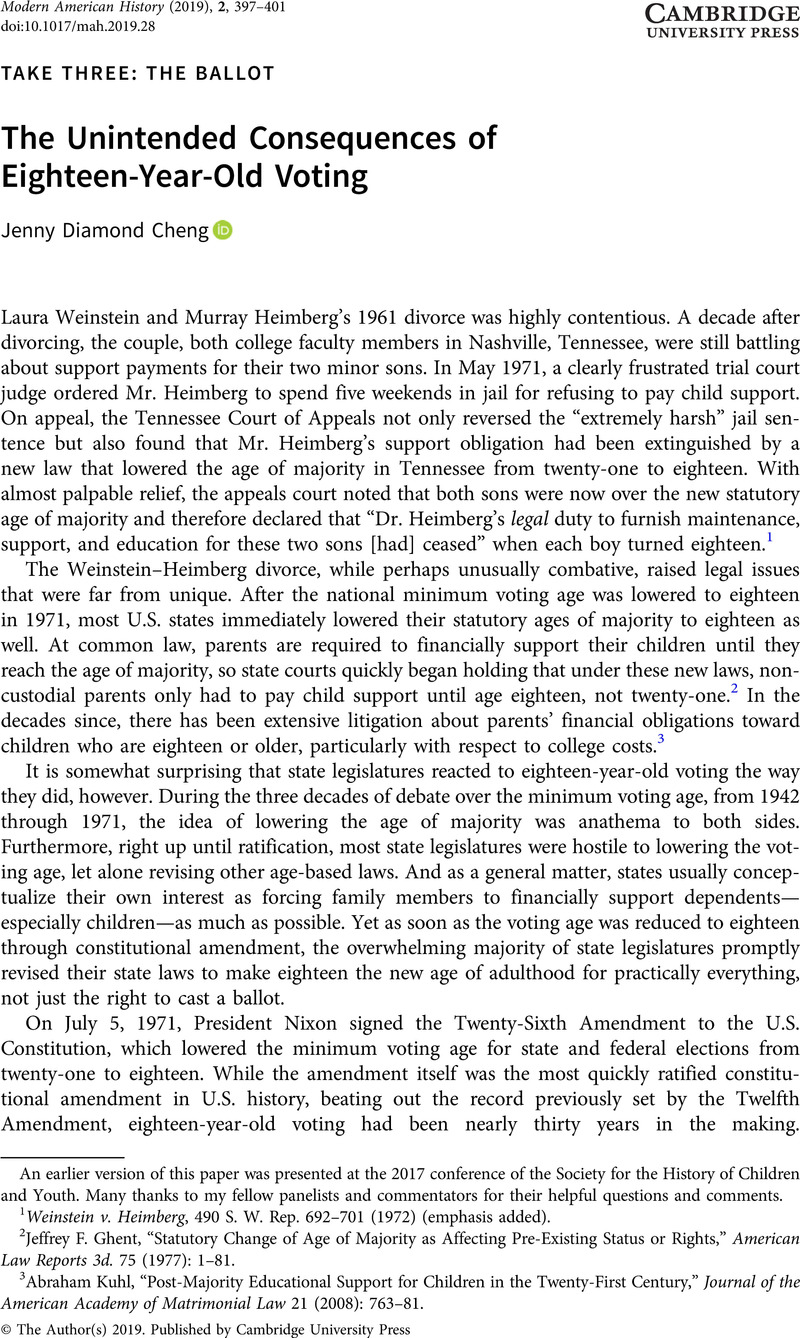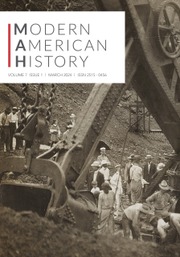No CrossRef data available.
Article contents
The Unintended Consequences of Eighteen-Year-Old Voting
Published online by Cambridge University Press: 09 December 2019
Abstract

Keywords
- Type
- Take Three: The Ballot
- Information
- Copyright
- Copyright © The Author(s) 2019. Published by Cambridge University Press
Footnotes
An earlier version of this paper was presented at the 2017 conference of the Society for the History of Children and Youth. Many thanks to my fellow panelists and commentators for their helpful questions and comments.
References
1 Weinstein v. Heimberg, 490 S. W. Rep. 692–701 (1972) (emphasis added).
2 Ghent, Jeffrey F., “Statutory Change of Age of Majority as Affecting Pre-Existing Status or Rights,” American Law Reports 3d. 75 (1977): 1–81Google Scholar.
3 Kuhl, Abraham, “Post-Majority Educational Support for Children in the Twenty-First Century,” Journal of the American Academy of Matrimonial Law 21 (2008): 763–81Google Scholar.
4 Cheng, Jenny Diamond, “Voting Rights for Millennials: Breathing New Life into the Twenty-Sixth Amendment,” Syracuse Law Review 67, no. 3 (Mar. 2017): 653–78Google Scholar, here 668–72. For a comprehensive history of the Twenty-Sixth Amendment, see Jenny Diamond Cheng, “How Eighteen-Year-Olds Got the Vote,” Aug. 4, 2016, available at https://ssrn.com/abstract=2818730.
5 Congressional Record, 91 Cong., 1 sess., June 17, 1970, 20175.
6 Robert H. Mnookin and D. Kelly Weisberg, Children, Family, and State: Problems and Materials on Children and the Law (New York, 2014), 169.
7 See, for example, Utah Code Annotated 1943 682 (1943).
8 Barnes, Wayne R., “Arrested Development: Rethinking the Contract Act of Majority for the Twenty-First Century Adolescent,” Maryland Law Review 76 (2017): 405–48Google Scholar, here 414; Wagenaar, Alexander C., Alcohol, Young Drivers, and Traffic Accidents (Lexington, MA, 1983), 2Google ScholarPubMed; National Rifle Association of America, Inc., v. Bureau of Alcohol, Tobacco, Firearms, and Explosives, 700 F. 3d. 185, here 201–2.
9 Congressional Record, 91 Cong., 2 sess., Mar. 12, 1970, 7091. Miller proposed an amendment to Senate Majority Leader Mike Mansfield's (R-MT) own proposed amendment to the Voting Rights Act, which would have prohibited states from setting their voting ages above eighteen. Miller's proposal outlawed any state “requirement that a citizen be twenty-one years of age as a precondition to full rights and responsibilities of citizenship”: ibid.
10 Congressional Record, 91 Cong., 2 sess., Mar. 12, 1970, 7092. Miller introduced his amendment by noting that he opposed lowering the voting age by statute, as Mansfield proposed to do: ibid at 7091. Miller's concerns about eighteen-year-old voting were not limited to Congressional overreach, though; in a 1968 committee hearing he argued that teenagers were too immature and prone to extremism to be allowed to vote. U.S. Congress, Senate, Committee on the Judiciary, Lowering the Voting age to 18, 90 Cong., 2nd sess., May 14, 1968, 15–19. Eric Fish has similarly argued that the framers of the Twenty-Sixth Amendment intended only to lower the voting age, not to ban age discrimination against eighteen- to twenty-one-year-olds. Fish, Eric S., “Originalism, Sex Discrimination, and Age Discrimination,” Texas Law Review 91 (2012): 1–18Google Scholar, here 7–8, 10–11.
11 Warren K. Leffler, NEW YORK CITY & Youth Vote Project 5th Ave., June 22, 1971. Library of Congress Prints and Photographs Division, Washington DC. Accessed Sep. 26, 2019, https://www.loc.gov/pictures/item/2017646334/.
12 Fish, “Originalism, Sex Discrimination, and Age Discrimination,” 7–8.
13 Cheng, “How Eighteen-Year-Olds Got the Vote,” 36.
14 George B. Merry, “‘Early-Adulthood’ Statutes Spreading,” Christian Science Monitor, Oct. 5, 1973, 4.
15 Miss. Code Ann. § 1-3-27.
16 See also Scott, Elizabeth S., “The Legal Construction of Adolescence,” Hofstra Law Review 29 (2000): 547–98Google Scholar, here 563–4.
17 The 1972 Democratic platform asserted that the party would try to “[l]ower the legal age of majority and consent to 18.” The Republican platform declared, “We stand for lowering the legal age of majority in all jurisdictions to 18.…” National Party Platforms, The American Presidency Project, University of California at Santa Barbara, https://www.presidency.ucsb.edu/documents/app-categories/elections-and-transitions/party-platforms (accessed July 21, 2019).
18 There is no evidence that there was any kind of concerted lobbying effort by noncustodial parents or others with an interest in limiting parents’ financial obligations, for example.
19 See, for example, Charles H. Mayer, “Letter to the Editor: Age of Majority,” Washington Post, Feb. 17. 1974, B7; William W. Kiefer, “New Age Law to Cut 600 from Welfare,” The Hartford Courant, Sept. 1, 1972, 6.
20 Richard Martin, “No Place Like Home: The 18-Year-Old Vote Imperils the Finances of State-Run Colleges,” Wall Street Journal, May 10, 1972, 1.
21 See, for example, “Michigan to Give 18-Year-Olds Adults’ Legal Rights and Duties,” New York Times, July 24, 1971, 29; Jurate Kaziskas, “‘Instant Adulthood’ for 11-Million Youths?” Washington Post, Oct. 10, 1971, K12.
22 Merry, “‘Early-Adulthood’ Statutes Spreading,” 4; Agis Salpukas, “Youth See Little Effect from Newly Won Rights,” New York Times, Jan. 1, 1972, 1.
23 Craig v. Boren, 429 U.S. 190 (1976).
24 Wagenaar, Alcohol, Young Drivers, and Traffic Accidents, 9–100.
25 Lerner, Barron H., One for the Road: Drunk Driving Since 1900 (Baltimore, 2011), 90Google Scholar.
26 Maggie Astor, “16-Year-Olds Want a Vote. Fifty Years Ago, So Did 18-Year-Olds,” New York Times, May 19, 2019.


